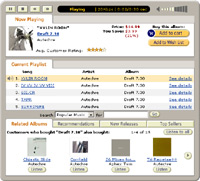The hugely anticipated MMORPG (massively multiplayer online role-playing game) True Fantasy Online, seen as a competitor to Final Fantasy X and tool for winning over Japanese gamers has been scrapped after more than three years in development.
The title had already been delayed three times – it was originally intended to go live in Spring. Role-playing games are enormously popular with Japanese players, and indeed the country is the source of all the best RPG franchises: Final Fantasy, Breath of Fire, Vagrant Story, to name just a few. Japan also is home to a phenomena known as “Final Fantasy Flu” where there is a sudden peak in staff calling in sick on major RPG launch days.
Level 5, developers of the game have an incredible track record when it comes to games – they’re already responsible for the best-selling Dragon Quarter and Dark Cloud series.
Peter Moore, of Microsoft’s games unit, and formerly of Sega, said: “It was very, very clear to us that there was no way for the quality level we needed that it was going to make winter. We wish that we could just through sheer force of will bring this game to market. It just isn’t happening. We started to be concerned with timetables and milestones in recent months. The developer, who we have the greatest regard for … agreed with us.”
Since launch, Microsoft have sold just 500,000 consoles in Japan – reasons given revolve around the sheer size of the console (it originally launched with a special controller that was smaller than the standard US/UK issue – now available worldwide) and lack of games designed to appeal to Japanese gamers. By comparison, Sony has sold 15 million Playstation2 consoles, Nintendo has sold 3.2 million GameCubes.
The MMORPG market worldwide is acknowledged as being difficult to crack – despite being relatively new, there are already well-established games in operation and players are loath to switch between them. Everquest is undoubtedly the most popular with more than 420,000 subscribers paying $12.95 per month to punch rats in the face and steal their whiskers for one experience point.
 Amazon.com have quietly rolled out a nifty new music preview feature, allowing much more convenient previews than before. The site’s erstwhile preview system was always a bit hit and miss, lacking in some obvious functions, but the new system, comprising of a pop-up box control panel with more than a whiff of iTunes about it is much better and demonstrates that it’s not just the better download sites that allow you to try before you buy.
Amazon.com have quietly rolled out a nifty new music preview feature, allowing much more convenient previews than before. The site’s erstwhile preview system was always a bit hit and miss, lacking in some obvious functions, but the new system, comprising of a pop-up box control panel with more than a whiff of iTunes about it is much better and demonstrates that it’s not just the better download sites that allow you to try before you buy.